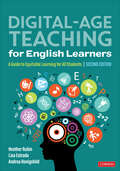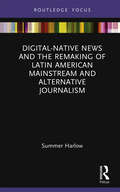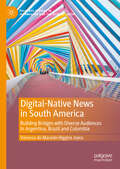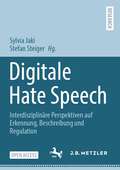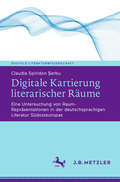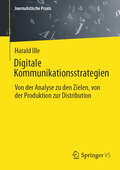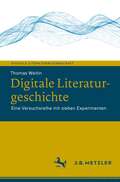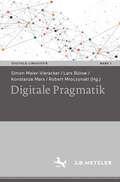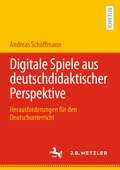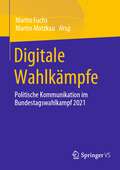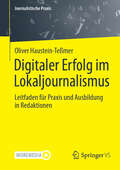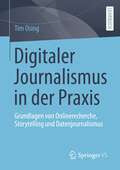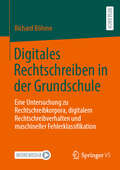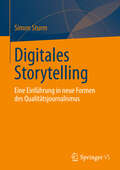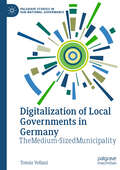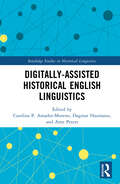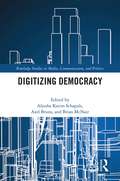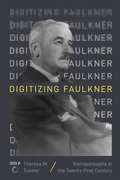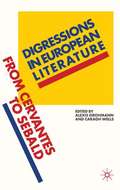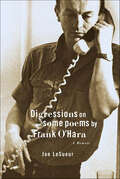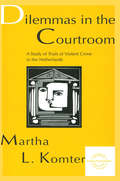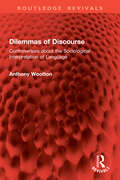- Table View
- List View
Digital-Age Teaching for English Learners: A Guide to Equitable Learning for All Students
by Lisa M. Estrada Andrea Honigsfeld Heather RubinBridge the Digital Divide with Research-Informed Technology Models Since the first edition of this bestselling resource many schools are still striving to close the digital divide and bridge the opportunity gap for historically marginalized students, including English learners. And the need for technology-infused lessons specifically aligned for English learners is even more critically needed. Building from significant developments in education policy, research, and remote learning innovations, this newly revised edition offers unique ways to bridge the digital divide that disproportionally affects culturally and linguistically diverse learners. Designed to support equitable access to engaging and enriching digital-age education opportunities for English learners, this book includes Research-informed and evidence-based technology integration models and instructional strategies Sample lesson ideas, including learning targets for activating students’ prior knowledge while promoting engagement and collaboration Tips for fostering collaborative practices with colleagues Vignettes from educators incorporating technology in creative ways Targeted questions to facilitate discussions about English language development methodology Complete with supplementary tools and resources, this guide provides all of the methodology resources needed to bridge the digital divide and promote learning success for all students.
Digital-Native News and the Remaking of Latin American Mainstream and Alternative Journalism (Disruptions)
by Summer HarlowDigital-Native News and the Remaking of Latin American Mainstream and Alternative Journalism explores the rise of independent, digital-native news outlets in Latin America and their role in social change, protest participation, and the refinement of the concept of "alternative" media. Drawing upon a decade of original research, including interviews, surveys, focus groups, and content analyses, this book questions how the emergence of online-native news sites in Latin America is redefining our understanding of what it means to be mainstream and what it means to be alternative. By analyzing a wide range of elements, from business models and audience behaviors to social media use and the role of gender, this text examines how these sites are challenging traditional, hegemonic mainstream news media and its service to political and economic elites. The result is a discerning investigation into the new brand of journalism these sites have innovated. This insightful study will be of interest to journalism, communication, and Latin American scholars, particularly those interested in how technology is moulding journalistic practices and changing conceptions of journalism itself.
Digital-Native News in South America: Building Bridges with Diverse Audiences in Argentina, Brazil and Colombia (Palgrave Studies in Journalism and the Global South)
by Vanessa de Macedo Higgins JoyceThis book investigates the strategies used by South American digital-native news media in attracting diverse audiences, and their effectiveness, from an audience perspective, in bridging communities and building consensus.In recent years, independent digital news outlets have emerged in a landscape of increasing ideological polarization. The book addresses the pivotal question of whether these organizations can help promote social cohesion and overcome a divided and fragmented market. Drawing from extensive interviews conducted with audience members, journalists, and media executives from the established news markets of Argentina, Brazil and Colombia, de Macedo Higgins Joyce sheds new theoretical insights on the strategies and practice of independent digital news, its evolution, and its agenda-setting impact in the region.Innovative and rigorous, Digital-Natives News in South America deftly explores this new and important field of research and will be of interest to journalism researchers and media practitioners alike.
Digitale Hate Speech: Interdisziplinäre Perspektiven auf Erkennung, Beschreibung und Regulation
by Stefan Steiger Sylvia JakiIn diesem Open-Access Buch wird Hate Speech (oder synonym Hassrede) im Internet interdisziplinär diskutiert. Die Beiträge, die aus den Bereichen Linguistik, Sprachtechnologie, Informationswissenschaft und Politikwissenschaft stammen, beleuchten zentrale Fragen im Zusammenhang mit diesem Phänomen. Hierzu zählen aus sprachwissenschaftlicher Sicht zunächst die vielfältigen direkten und indirekten Erscheinungsformen von Hate Speech und ihre Rezeption. Aus informationswissenschaftlicher und computerlinguistischer Sicht wird der Forschungsstand in Bezug auf verschiedene maschinelle Verfahren zur automatischen Erkennung von Hate Speech wiedergegeben. Überdies wird erläutert, wie solche Verfahren evaluiert werden können. Daher stellt sich aus politikwissenschaftlicher Sicht nicht nur die Frage, wie digitale Hassrede derzeit reguliert wird und wie sich diese Regulierungsverfahren künftig entwickeln könnten, sondern auch, wie die automatische Erkennung reguliert werden müsste.
Digitale Kartierung literarischer Räume: Eine Untersuchung von Raum-Repräsentationen in der deutschsprachigen Literatur Südosteuropas (Digitale Literaturwissenschaft)
by Claudia Spiridon ȘerbuDas Buch präsentiert eine mathematische Leseart des literarischen Raums, die als Werkzeug benutzt wird, um die Verflechtungen von Raum, Zeit, Thematik, Handlungsverlauf, Figurenkonstellation und Erzählperspektive in interkulturellen Romanen kartographisch zu untersuchen. Im Mittelpunkt des Projekts steht eine Datenbank von dreiundsiebzig Romanen, die nach 1990 veröffentlicht wurden und unter dem Begriff Eastern European turn in der deutschsprachigen Literatur subsumiert wurden.
Digitale Kommunikationsstrategien: Von der Analyse zu den Zielen, von der Produktion zur Distribution (Journalistische Praxis)
by Harald IlleStrategie ist, es anders zu machen als alle anderen. Wenn digitale Kanäle geflutet werden mit heterogenen Angeboten, dann bringt ein „Mehr vom Gleichen&“ niemanden weiter. Strategische Kommunikation versucht daher, zu verstehen: Wie ticken unsere Zielgruppen, und für welche Themen und Inhalte interessieren sie sich wann und warum? Wie sind ihre Bedürfnisse, und haben wir ausreichend passgenaue Inhalte für sie? Strategie-Modelle wie 3H, SCOM und der Content Strategy Quad helfen, genau die passenden Themen zu finden – also schauen wir sie uns an. Am Ende soll digitale Kommunikation auch ihren Beitrag zur Wertschöpfung des Unternehmens leisten. Welche Modelle und Metriken helfen in der Praxis, effektiver und effizienter digital zu kommunizieren? Das Praxishandbuch folgt dem POST-Modell von Bernoff und Li, um diese Frage strukturiert zu beantworten: Wer kommuniziert für wen mit welchen Zielen? Welche Funktion hat welcher Content und wie entsteht die optimale Themenarchitektur? Und schließlich: Wie hilft Technologie, diesen Content zu distribuieren?
Digitale Literaturgeschichte: Eine Versuchsreihe mit sieben Experimenten (Digitale Literaturwissenschaft)
by Thomas WeitinMit digitalen Methoden sehen wir die Literaturgeschichte vollständig – Analysen großer Textmengen konfrontieren den gelehrten Kanon meist männlicher Autoren mit Werken, die das kulturelle Gedächtnis verdrängt hat. Viele von ihnen stammen von Frauen. Digitale Literaturgeschichte erläutert Methoden zum Vergleich weiblichen und männlichen Schreibens, die von der Stilometrie über maschinelles Lernen bis zur Netzwerkanalyse reichen, und zeigt, warum viele Autorinnen in Vergessenheit geraten sind. Alle Daten und Code-Dateien werden zur Verfügung gestellt – so entsteht Literaturgeschichte zum Mitmachen.
Digitale Pragmatik (Digitale Linguistik #1)
by Konstanze Marx Simon Meier-Vieracker Lars Bülow Robert MroczynskiDie Digitalisierung betrifft auch die linguistische Pragmatik. In den digitalen Medien lassen sich vielfältige Sprachgebrauchsphänomene beobachten, die mit den einschlägigen pragmatischen Konzepten theoretisch modelliert und empirisch untersucht werden können. Auch finden digitale Forschungsmethoden zunehmend in pragmatischen Forschungskontexten Anwendung, etwa korpuslinguistische Zugriffe im Rahmen der Korpuspragmatik. Die Beiträge des Bandes zeigen, wie die Hinwendung der linguistischen Pragmatik zu digitalen Gegenständen und digitalen Methoden die pragmatische Theorie und Methodologie in vielerlei Hinsicht neu konturiert.
Digitale Spiele aus deutschdidaktischer Perspektive: Herausforderungen für den Deutschunterricht
by Andreas SchöffmannAndreas Schöffmann stellt in dem vorliegenden Buch die Frage „Was haben Computerspiele im Deutschunterricht zu suchen?“ vom Kopf auf die Füße. Er zeigt, was das Fach Deutsch aus seiner spezifischen Perspektive beitragen kann, um Heranwachsenden Bildungsmomente beim Spielen am Computer zu ermöglichen. Die Analyse bietet damit in mehrfacher Hinsicht Perspektivwechsel an, um digitale Spiele als wertvolle Bildungsmedien wahrnehmbar zu machen, die sich positiv auf den Medienkompetenzerwerb sowie die Identitäts- und Werteentwicklung auswirken.
Digitale Wahlkämpfe: Politische Kommunikation im Bundestagswahlkampf 2021
by Martin Fuchs Martin MotzkauDer Sammelband beleuchtet die verschiedenen Folgen zunehmender digitaler Wahlkämpfe anhand der Bundestagswahl 2021 für Politik, Journalismus und Gesellschaft. Darüber hinaus ermöglichen die Erkenntnisse einen Blick in die Zukunft des digitalen Campaignings. Der digitale Wandel und die damit verbundenen Möglichkeiten für die politische Kommunikation werden die Wahlkämpfe der Zukunft immer stärker beeinflussen.Politische Challenges auf TikTok, Begleitung der TV-Trielle auf Twitter oder Haustürgespräche in der Dating-App – ein Wahlkampf ohne digitale Plattformen und Formate ist heute undenkbar. Entsprechend erhöhen Parteien, Spitzenkandidat*innen und andere politische Akteure ihre Budgets für den Online-Wahlkampf und professionalisieren Personal und Strukturen, um die Wähler*innen noch effizienter zu erreichen und zu mobilisieren. Im Bundestagswahlkampf 2021 beschleunigte die Corona-Pandemie diesen Trend, da traditionelle Wahlkampfveranstaltungen auf Marktplätzen oder in Hallen aufgrund der Maßnahmen zur Bekämpfung des Virus kaum möglich waren. Die Parteien und Kandidat*innen waren noch stärker auf digitale Plattformen angewiesen und die Strategien entsprechend detailreicher als in den Jahren zuvor.
Digitaler Erfolg im Lokaljournalismus: Leitfaden für Praxis und Ausbildung in Redaktionen (Journalistische Praxis)
by Oliver Haustein-TeßmerDieses Buch hilft Führungskräften und Mitarbeitenden in Redaktionen, digitale Werkzeuge erfolgreich anzuwenden. Es richtet sich an erfahrene und neu einsteigende Journalistinnen und Journalisten. Im Fokus stehen dringende Fragen der digitalen Transformation: Wie erreichen lokale Medien mehr und jüngere Menschen? Wie gewinnen und halten regionale Verlage Abonnentinnen und Abonnenten online? Die Leserinnen und Leser lernen, welche Strategien eine digitale Arbeitsweise befördern. Der Leitfaden erläutert datenorientiertes Planen und Produzieren sowie die Arbeit mit Zielgruppen und deren Bedürfnissen (User Needs). Checklisten, Grafiken und Tabellen sorgen für Übersicht. Es gibt viele Praxisbeispiele; Interviews mit Fachleuten bieten zusätzliche Einblicke. Der Autor geht auf Trends wie konstruktiven Journalismus ein und zeigt, wie journalistische Qualität mit dem Einsatz generativer Künstlicher Intelligenz vereinbar ist. Ein Schwerpunkt liegt auf Karrierechancen und Ausbildung. Dabei berücksichtigt der Autor sowohl die Perspektive journalistischer Talente als auch die veränderten Anforderungen an Volontariate und ausbildende Medienunternehmen. Ziel ist es zu zeigen, wie vielfältig Journalismus als Beruf in der digitalisierten Gesellschaft wirken kann. Per App: einfach die SN More Media App kostenfrei herunterladen, ein Bild oder einen Link mit dem Play-Button scannen und sofort die Videos auf Smartphone oder Tablet ausspielen.
Digitaler Journalismus in der Praxis: Grundlagen von Onlinerecherche, Storytelling und Datenjournalismus
by Tim OsingDieses Lehrbuch vermittelt die besonderen Möglichkeiten des digitalen Journalismus. Es erklärt mit großem Praxisbezug und vielen Beispielen digitales Storytelling, zeigt Techniken des Datenjournalismus und liefert Tipps und Tools für die Recherche im Internet. Um einer digitalisierten Welt gerecht werden zu können, müssen Journalist*innen sich dieses Handwerk aneignen – und es intuitiv einsetzen können, da im hektischen Alltag einer Online-Redaktion nicht viel Zeit bleibt. Wer Open Data richtig nutzen, Geschichten multimedial erzählen und Fakten zügig überprüfen kann, hebt sich im Internet und den sozialen Medien entscheidend ab.
Digitales Rechtschreiben in der Grundschule: Eine Untersuchung zu Rechtschreibkorpora, digitalem Rechtschreibverhalten und maschineller Fehlerklassifikation
by Richard BöhmeDer Erwerb der Rechtschreibung ist eine äußerst anspruchsvolle Aufgabe. Digitale Medien haben das Potenzial, Schüler*innen dabei durch adaptive Angebote zu unterstützen. Voraussetzung dafür sind Machine-Learning-Verfahren, die Rechtschreibfehler von Schüler*innen zuverlässig klassifizieren. Allerdings bestehen in diesem Zusammenhang einige Entwicklungs- und Forschungsdesiderate. Die folgenden wurden adressiert: Zunächst wurden gängige Grund- und Orientierungswortschätze einer umfassenden Korpusanalyse unterzogen. In den Ergebnissen zeigt sich, dass zwar ein Großteil der Wörter graphematisch, aber nur ein Bruchteil rein phonematisch herzuleiten ist. Unter Verwendung der analysierten Wörter und einer eigens entwickelten Rechtschreib-App wurde das digitale, prozessbezogene Rechtschreibverhalten von Schüler*innen mit hoher und niedriger Rechtschreibkompetenz untersucht. Die Ergebnisse machen deutlich, dass sich die Schüler*innen u.a. in ihrer Fehlersensibilität, ihrer aktiven Auseinandersetzung mit Fehlerkorrekturen und ihrem systematischen Vorgehen beim Hypothesentesten unterscheiden. Die fehlerhaften Verschriftungen der Schüler*innen wurden wiederum dafür genutzt, um Machine-Learning-Algorithmen zu trainieren. Die Evaluation zeigt, dass Rechtschreibfehler damit äußerst zuverlässig klassifiziert werden können.
Digitales Storytelling: Eine Einführung in neue Formen des Qualitätsjournalismus
by Simon SturmDas Buch gibt einen Einblick in die neuen Erzählweisen des digitalen Journalismus. Es untersucht die Auswirkungen der Digitalisierung auf die Medienbranche und den mit ihr verbundenen Wandel journalistischer Darstellungsformen. Dabei geht es auch um die Möglichkeiten des journalistischen Storytellings auf mobilen Endgeräten wie Tablet-Computern. Es wird eine neuartige Typologie von Darstellungsformen entwickelt, die u ber die klassischen Text-, Audio- und Fernsehformate hinaus digitales Storytelling ermöglicht.
Digitalization of Local Governments in Germany: The Medium-Sized Municipality (Palgrave Studies in Sub-National Governance)
by Tomás VellaniThis book provides an in-depth analysis of the digital policy of medium-sized municipalities in Germany. Mostly ignored by empirical research, the size of these municipalities has been characterized both as an advantage and a limitation for digitalization, with scholars alternately emphasizing agility and shorter administrative paths on the one hand, and the lack of capacity and economies of scale on the other. Utilising a mixed methods approach combining process-tracing and web scraping, the book analyzes the characteristics of digital policy in medium-sized municipalities, and the effects of digitalization governance on service provision. It traces the historical trajectories of digitalization in pioneering municipalities, examines which factors influence favorable digital transformations, and analyzes the organizational structures dedicated to digitalization. The book also puts forward a typology to classify municipalities according to their digital governance, quantitatively describes the landscape of medium-sized municipalities, and delivers insights on the effects of governance on digital services. It will appeal to scholars, students and practitioners of public administration, local government and digitalization.
Digitally-assisted Historical English Linguistics (Routledge Studies in Historical Linguistics)
by Dagmar Haumann Arne Peters Amador-Moreno, Edited by Carolina P.This collection features different perspectives on how digital tools are changing our understanding of language varieties, language contact, sociolinguistics, pragmatics, and dialectology through the lens of different historical contexts. With a clear focus on English, chapters in the volume showcase a broad range of digital methods and approaches that can contribute to advancing the study of historical linguistics. Visualization tools and corpus-linguistic techniques are part of the methodologies included in the volume. The chapters present empirically based research and discuss theoretical aspects that emphasize how digitalization is changing our analysis of different domains of language, going from phonology to specific grammatical/morphosyntactic and lexical features, to discourse-related issues more broadly. This book will be of interest to scholars of the history of the English language, historical linguistics, corpus linguistics, and digital humanities.
Digitizing Democracy (Routledge Studies in Media, Communication, and Politics)
by Axel Bruns Brian McNair Aljosha Karim SchapalsWhat are the key challenges facing our increasingly digitized democracy, and how might we as citizens contribute to resolving them? This book explores these questions, adopting a multi-disciplinary approach that combines work from media studies, journalism studies, and political science scholars, and draws on trends in countries including Australia, the United States, the United Kingdom, Egypt, and Indonesia. The book is divided into four main themes: (1) the impact of digital communication on politics and government; (2) the future of news and journalism in the network society; (3) the potential of digital media to enhance civic engagement and social inclusion; and (4) visions for the future of digital democracy.
Digitizing Faulkner: Yoknapatawpha in the Twenty-First Century
by John Michael Corrigan Stephen Railton Christopher Rieger Melanie Benson Taylor Erin Penner Johannes Burgers Ren Denton Jennie Joiner Ben Robbins Lorie WatkinsFor more than eighty years, Faulkner criticism has attempted to "see all Yoknapatawpha," the fictional Mississippi county in which the author set all but four of his novels as well as more than fifty short stories. One of the most ambitious of these attempts is the ongoing Digital Yoknapatawpha, an online project that is encoding the texts set in Faulkner’s mythical county into a complex database with sophisticated front-end visualizations. In Digitizing Faulkner, the contributors to the project share their findings and reflections on what digital research can mean for Faulkner studies and, by example, other bodies of literature.The essays examine Faulkner’s characters, events, locations, and visualizations, as well as offering more theoretical reflections on digitally mapping specific texts and stories, including the pedagogical implications of this digital approach. Digitizing Faulkner explores how a twenty-first-century research tool intersects with twentieth-century sensibilities, ideologies, behaviors, and material cultures to modify and enhance our understanding of Faulkner’s texts.Contributors:Johannes Burgers, Ashoka University * John Michael Corrigan, National Chengchi University, Taiwan * Ren Denton, East Georgia State College * Jennie Joiner, Keuka College * Erin Penner, Asbury University * Stephen Railton, University of Virginia * Christopher Rieger, Southeast Missouri State University * Ben Robbins, University of Innsbruck * Melanie Benson Taylor, Dartmouth College * Lorie Watkins, William Carey University
Diglossia and Language Contact
by Lotfi SayahiThis volume provides a detailed analysis of language contact in North Africa and explores the historical presence of the languages used in the region, including the different varieties of Arabic and Berber as well as European languages. Using a wide range of data sets, it provides a comprehensive analysis of the mechanisms of language contact under classical diglossia and societal bilingualism, examining multiple cases of oral and written code-switching. It also describes contact-induced lexical and structural change in such situations and discusses the possible appearance of new varieties within the context of diglossia. Examples from past diglossic situations are examined, including the situation in Muslim Spain and the Maltese Islands. An analysis of the current situation of Arabic vernaculars, not only in the Maghreb but also in other Arabic-speaking areas, is also presented. This book will appeal to anyone interested in language contact, the Arabic language, and North Africa.
Digressions in European Literature
by Alexis Grohmann Caragh WellsWith studies of, amongst others, Miguel de Cervantes, Anton Chekhov, Charles Baudelaire and Henry James, this landmark collection of essays is a unique and wide-ranging exploration and celebration of the many forms of digression in major works by fifteen of the finest European writers from the early modern period to the present day.
Digressions on Some Poems by Frank O'Hara: A Memoir
by Joe LeSueurAn unprecedented eyewitness account of the New York School, as seen between the lines of O'Hara's poetryJoe LeSueur lived with Frank O'Hara from 1955 until 1965, the years when O'Hara wrote his greatest poems, including "To the Film Industry in Crisis," "In Memory of My Feelings," "Having a Coke with You," and the famous Lunch Poems—so called because O'Hara wrote them during his lunch break at the Museum of Modern Art, where he worked as a curator. (The artists he championed include Jackson Pollock, Joseph Cornell, Grace Hartigan, Jane Freilicher, Joan Mitchell, and Robert Rauschenberg.) The flowering of O'Hara's talent, cut short by a fatal car accident in 1966, produced some of the most exuberant, truly celebratory lyrics of the twentieth century. And it produced America's greatest poet of city life since Whitman.Alternating between O'Hara's poems and LeSueur's memory of the circumstances that inspired them, Digressions on Some Poems by Frank O'Hara is a literary commentary like no other—an affectionate, no-holds-barred memoir of O'Hara and the New York that animated his work: friends, lovers, movies, paintings, streets, apartments, music, parties, and pickups. This volume, which includes many of O'Hara's best-loved poems, is the most intimate, true-to-life portrait we will ever have of this quintessential American figure and his now legendary times.
Dikengkeng Tsa Tshepo: UBC Contracted
by P.R.S. MaphikeKe boikarabelo ba batswadi ho hodisa ngwana eo. Batho bao e seng badumedi ba fumana bothata. Kgang o ne a tshajwa motseng wa habo. Eitse hoba Mmopi a ba putse ka lesea, a qalella ho ngongoreha ka hore ngwana eo o tla fetoha lejakane a lebale meetlo.
Dikengkeng Tsa Tshepo: UBC Uncontracted
by P.R.S. MaphikeKe boikarabelo ba batswadi ho hodisa ngwana eo. Batho bao e seng badumedi ba fumana bothata. Kgang o ne a tshajwa motseng wa habo. Eitse hoba Mmopi a ba putse ka lesea, a qalella ho ngongoreha ka hore ngwana eo o tla fetoha lejakane a lebale meetlo.
Dilemmas in the Courtroom: A Study of Trials of Violent Crime in the Netherlands (Everyday Communication Ser.)
by Martha L. KomterInteractional dilemmas occur when participants are required to engage in two contradictory activities at the same time or orient to two conflicting goals. The existence of such dilemmas provides a context for interactants to be creative, pro-active, and indeed strategic as they maneuver between the numerous demands placed on them and produce behavior that fits the ongoing communication episode. Trials are one such episode in which the various participants -- in this case, the judge, the defendant, and lawyers -- experience interactional dilemmas and work to resolve these through their behavior. This volume offers an analysis of both the institutional factors which promote dilemmas during court proceedings and the interactional behaviors used by trial participants to navigate these dilemmas. Using ethnomethodology, conversation analysis, and ethnography as complementary methods, Komter's research combines an understanding of the legal rules for courtroom procedure and crime descriptions, with details of actual trial discourse. The analysis is based upon fieldnotes of 48 trials and audiotapes of 31 trials, all related to violent crimes and occurring in courtrooms in Amsterdam, Utrecht, and Haarlem. Dilemmas reflect enduring conflicts of interest or values; they derive from the ongoing institutional and interactional positions of the various courtroom participants. Komter points to the existence of dilemmas and to their role in shaping unfolding interaction during the trials. She especially highlights the different dilemmas faced by judges and suspects, and the ways in which behavior on the part of one constrains that of the other. She further reveals the wide variety of ways in which interactants handle dilemmas -- their innovativeness and resourcefulness -- and the consequences these have for the unfolding interaction and the court's ultimate judgment. Of course, dilemmas are not only relevant to an understanding of judicial interaction. This study has implications for other contexts, since concerns with credibility, blame, responsibility, and morality -- and their opposites -- are incorporated into many everyday interactions. This volume examines behavior that is quite specific to a single context, yet its conclusions bear upon a wide range of communication events. Of interest to scholars in communication, linguistics, anthropology, criminal justice, or those with interests in ethnomethodology, conversation analysis, and ethnography.
Dilemmas of Discourse: Controversies about the Sociological Interpretation of Language (Routledge Revivals)
by Anthony WoottonFirst Published in 1975, Dilemmas of Discourse brings together strands of arguments from disciplines like sociology, anthropology, linguistics and philosophy to explore the debate around the issue of deciding the meaning of what people may say. Can the meaning of words be described satisfactorily as a bundle of semantic features? Can speech acts such as promising and insulting be described as only occurring when a particular form of speech is used in a particular kind of context? Do sociolinguistic rules have a bearing on the problem of extracting the meaning of what people say? What sorts of implications does ethnomethodology have for areas of traditional sociological interest in language such as vocabularies of motives or the relation of language used to social class? These are some of the questions which the author sets out to answer with clarity and carefulness uncharacteristic of much writing on this subject. In general, Dr Wootton defends the ethnomethodological position, and when relating these arguments to developments in mainstream sociology responds to certain criticisms made of recent ethnomethodological writing. But he is also at pains to point out the necessity of subjecting ethnomethodological interpretations to explicit forms of evaluation and suggests some ways in which this might be done. This is a must read for students of sociology.
